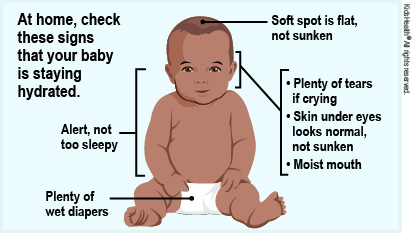Gastroenteritis: How to Care for Your Infant After Being in the Hospital
Gastroenteritis (also called the "stomach flu") is an infection that causes vomiting (throwing up) and diarrhea (watery poop). Many babies also have a fever. Babies who have gastroenteritis lose a lot of fluid in their poop or vomit. This can lead to dehydration (not having enough water in the body).
While in the hospital, the health care team gave your baby intravenous (IV) fluids for rehydration. They may have done some tests, like a stool culture or blood tests. Your baby now can be cared for at home. It might take some time for the diarrhea to get better. Help your baby stay hydrated until the diarrhea stops.


-
Let your baby rest as needed.
-
Make sure your baby drinks enough. Offer more breast milk or formula than usual.
-
If your health care provider recommended other drinks, an oral rehydration solution is the best choice. It has the right amount of water, sugar, and salt for babies and kids. Brand names include Pedialyte® and Enfalyte®, and many stores also have a store brand. You can buy them at drugstores or supermarkets without a prescription:
-
For infants younger than 6 months old, use an unflavored oral rehydration solution.
-
Infants older than 6 months old may prefer a flavored solution.
-
Don't offer plain water. It doesn't have the right nutrients for your baby.
-
Don't give juice, soda, or sports drinks, which have too much sugar for babies and can make diarrhea worse.
-
Never give medicines to treat diarrhea. These can cause sleep trouble, belly pain, or other problems in babies.
-
Only change your baby's diet if told to by your health care provider. He or she may ask you to try a different formula or change your diet if you're breastfeeding. Otherwise, you can feed your baby as usual if your child feels like eating.
-
You can give medicine for fever if your health care provider says it's OK. Use these medicines exactly as directed:
-
acetaminophen (such as Tylenol® or a store brand)
-
OR
-
ibuprofen (such as Advil®, Motrin®, or a store brand). Do not give to babies under 6 months old.
-
Don't give aspirin to your baby. It's linked to a rare but serious illness called Reye syndrome.

Your baby:

Your baby:
-
can't keep fluids down without vomiting
-
has vomit that's bright green, red, or brown
-
has a hard or swollen belly
-
seems to be in pain, or is crying and can't be comforted
-
appears dehydrated; signs include a dry mouth, few or no tears when crying, more than 4 to 6 hours without a wet diaper, sunken eyes or soft spot on the head, decreased alertness, fast breathing, and/or severe sleepiness

What causes gastroenteritis? Gastroenteritis happens when a germ (virus, bacterium, or parasite) infects the stomach or intestines. Viruses are the most common cause of gastroenteritis in kids.
How can we prevent gastroenteritis from spreading? To help prevent the spread of gastroenteritis:
-
Teach all family members to wash their hands well and often. They should wash for at least 20 seconds with soap and water. This is especially important after using the bathroom or changing a diaper, and before preparing or eating food.
-
Clean tabletops, doorknobs, and other hard surfaces with a cleaner that kills viruses.
-
Keep your baby out of child care until 24 hours have passed with no vomiting, diarrhea, or fever. Also keep your baby out of swimming pools until 1 week after the diarrhea stops.